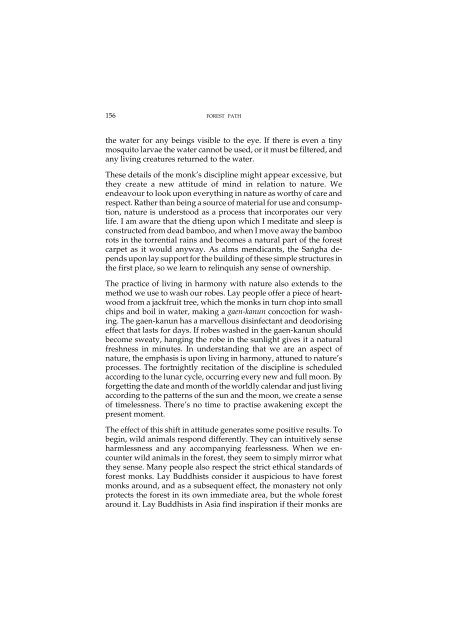Forest Path - Amaravati Buddhist Monastery
Forest Path - Amaravati Buddhist Monastery
Forest Path - Amaravati Buddhist Monastery
You also want an ePaper? Increase the reach of your titles
YUMPU automatically turns print PDFs into web optimized ePapers that Google loves.
156 forest path<br />
the water for any beings visible to the eye. If there is even a tiny<br />
mosquito larvae the water cannot be used, or it must be filtered, and<br />
any living creatures returned to the water.<br />
These details of the monk’s discipline might appear excessive, but<br />
they create a new attitude of mind in relation to nature. We<br />
endeavour to look upon everything in nature as worthy of care and<br />
respect. Rather than being a source of material for use and consumption,<br />
nature is understood as a process that incorporates our very<br />
life. I am aware that the dtieng upon which I meditate and sleep is<br />
constructed from dead bamboo, and when I move away the bamboo<br />
rots in the torrential rains and becomes a natural part of the forest<br />
carpet as it would anyway. As alms mendicants, the Saïgha depends<br />
upon lay support for the building of these simple structures in<br />
the first place, so we learn to relinquish any sense of ownership.<br />
The practice of living in harmony with nature also extends to the<br />
method we use to wash our robes. Lay people offer a piece of heartwood<br />
from a jackfruit tree, which the monks in turn chop into small<br />
chips and boil in water, making a gaen-kanun concoction for washing.<br />
The gaen-kanun has a marvellous disinfectant and deodorising<br />
effect that lasts for days. If robes washed in the gaen-kanun should<br />
become sweaty, hanging the robe in the sunlight gives it a natural<br />
freshness in minutes. In understanding that we are an aspect of<br />
nature, the emphasis is upon living in harmony, attuned to nature’s<br />
processes. The fortnightly recitation of the discipline is scheduled<br />
according to the lunar cycle, occurring every new and full moon. By<br />
forgetting the date and month of the worldly calendar and just living<br />
according to the patterns of the sun and the moon, we create a sense<br />
of timelessness. There’s no time to practise awakening except the<br />
present moment.<br />
The effect of this shift in attitude generates some positive results. To<br />
begin, wild animals respond differently. They can intuitively sense<br />
harmlessness and any accompanying fearlessness. When we encounter<br />
wild animals in the forest, they seem to simply mirror what<br />
they sense. Many people also respect the strict ethical standards of<br />
forest monks. Lay <strong>Buddhist</strong>s consider it auspicious to have forest<br />
monks around, and as a subsequent effect, the monastery not only<br />
protects the forest in its own immediate area, but the whole forest<br />
around it. Lay <strong>Buddhist</strong>s in Asia find inspiration if their monks are

















